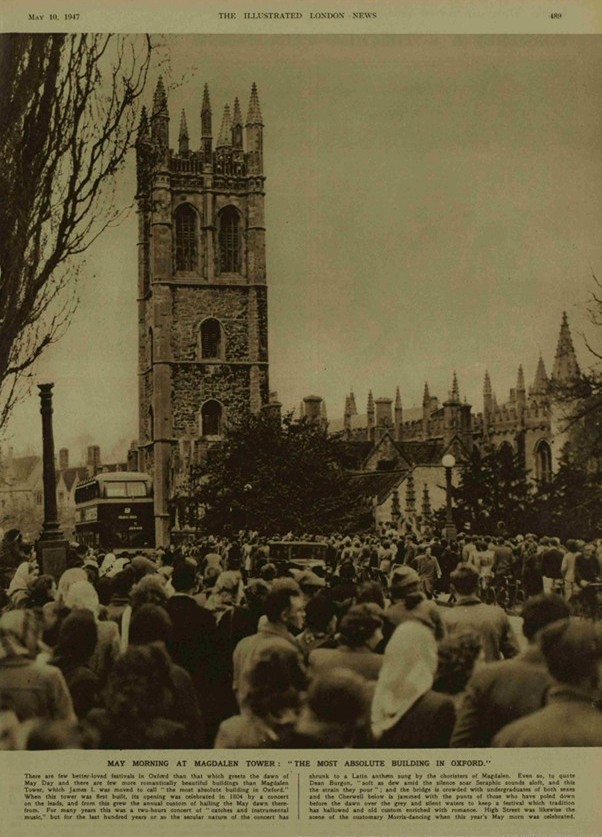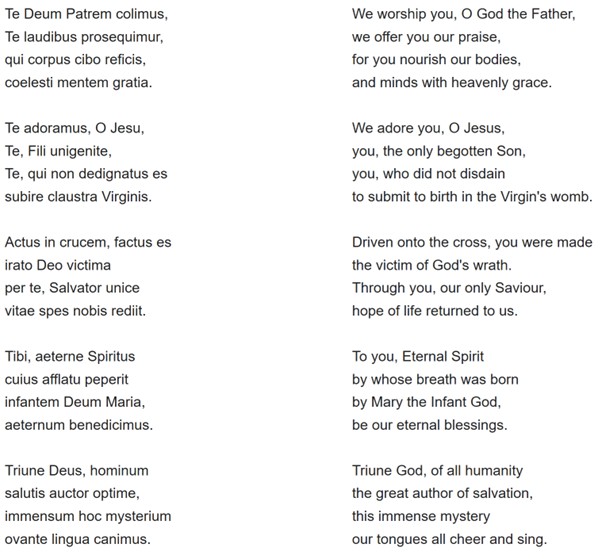It’s cold and wet and windy and December, so what better time to think of warmth and sunshine and spring?
Here’s a very well-known Oxford scene – Magdalen Bridge and the tower of Magdalen College. And they are the venue for one of Oxford’s more fun traditions: May Morning.
At 6am on 1 May, the choir of Magdalen College, from the top of the tower, sing the Hymnus Eucharisticus, all very proper; and then they sing a madrigal, Now is the Month of Maying, which is perhaps a little less proper. The Dean of Divinity says a prayer, and general jollification then commences, with Morris dancing, larking about, and just possibly the quaffing of drinks not normally associated with breakfast time.
The tradition is regarded as having been in place for 500 years. Not quite time immemorial (which is 1189) but the sixteenth century is still pretty old, by any measure. The Illustrated London News in May 1947 dates it to a concert held in 1504 to commemorate the opening of Magdalen Tower, and that sounds like a plausible explanation. At the very least, it coincides with the dates for the building the tower, and by 1504 there would likely have been enough tower to sing from.

There’s lots of other festivities and traditions – you can read all about them on the unambiguously named maymorning.co.uk. And if in Oxford on the night of 30 April you could get up early and take part yourself.
Hymnus Eucharisticus was composed by Benjamin Rogers, probably between 1665 and 1685 when he was organist at Magdalen (in 1685, according to the Dictionary of National Biography, he forfeited his place at Magdalen through misdemeanour). Its lyrics in Latin with an English translation are below. Top tip – when trying to read Latin out loud, say every syllable, remember that C is always hard, and V is said as a W.

Now is the Month of Maying is a madrigal – a type of music for voice, popular in the seventeenth and eighteenth century. And they are often very fun tunes, with very secular themes. Now is the Month of Maying is no exception; here are the lyrics:
Now is the month of Maying,
When merry lads are playing,
Fa la la la la la la la la,
Fa la la la la la la lah.
Each with his bonny lass
Upon the greeny grass.
Fa la la la la la la la la, etc…
The Spring, clad all in gladness,
Doth laugh at Winter’s sadness,
Fa la la, etc…
And to the bagpipe’s sound
The nymphs tread out their ground.
Fa la la, etc…
Fie then! why sit we musing,
Youth’s sweet delight refusing?
Fa la la, etc…
Say, dainty nymphs, and speak,
Shall we play barley break?
Fa la la etc…
Although Barley Break was a game, I suspect its meaning here suggested other activities which might cause barley, which was growing nicely by the start of May, to break. I will leave this to your imagination.
As is now my wont, I’ve created a jigsaw of the card for you to have ago at. Bear in mind Gerard Manley Hopkins’ description of Oxford as a “towery city and branchy between towers”. The specific greenhouses are no longer there, although the Botanic Garden, which is where they are, still has plenty.
And finally a word to salute the person in whose honour this post has been written: Sunday Blake, who is leaving Wonkhe after three years and innumerable great things done. Sunday requested this topic, and I can think of no better reason than that!













Dear Hugh,
What lovely imagery for a dreary December morning, and a beautiful tribute to Sunday. We already miss her on the podcast.
Good luck Sunday with your new career Sunday. I will miss you from Wonkhe and Sunday Margot.
hope the postcoard brings happy memories of oxford.
I’ve missed seeing Sunday’s insightful and unique perspective on Wonkhe. Her contributions brought a fresh voice to the platform. It’s a shame to lose such a talented writer. I hope we’ll see her work again soon, even as a guest contributor